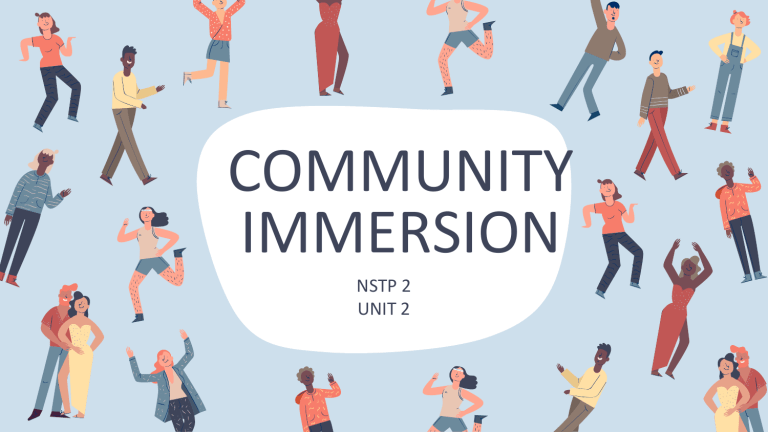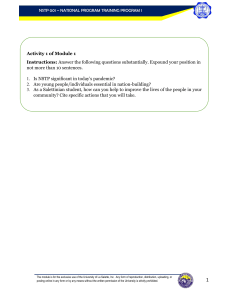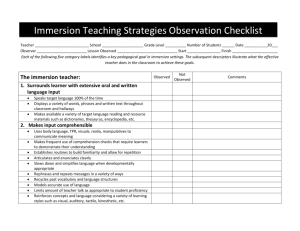
COMMUNITY IMMERSION NSTP 2 UNIT 2 OBJECTIVES 1. 2. EXPLAIN THE CONCEPTS AND PRINCIPLES UNDERPINNING COMMUNITY AND COMMUNITY IMMERSION REALIZE THE IMPORTANCE OF UNDERSTANDING THE DYNAMICS OF A COMMUNITY AND COMMUNITY IMMERSION AS A WAY TO REALIZE THE OBJECTIVES OF NSTP Whoa! Source: Cobigo, Virginie & Martin, Lynn & Mcheimech, Rawad. (2016). Understanding Community. Canadian Journal of Disability Studies. 5. 181. 10.15353/cjds.v5i4.318. COMMUNITY A community inherently consists of a group of people. It cannot be established by a sole individual. For instance, geographical location (e.g., neighborhood) is often a common element to various definitions of community. Labuguen FC, et al. 2020. Understanding the National Service Training Program, A Modular Worktext for NSTP 2. Mutya Publishing: Malabon City. Types of Community 1. 2. 3. Geographical Functional Relevant Labuguen FC, et al. 2020. Understanding the National Service Training Program, A Modular Worktext for NSTP 2. Mutya Publishing: Malabon City. GEOGRAPHY FUNCTIONAL RELEVANT COMMUNITY “A community is a collective of people with similar interests and goals whether living in the same geographical locality or not”; Labuguen FC, et al. 2020. Understanding the National Service Training Program, A Modular Worktext for NSTP 2. Mutya Publishing: Malabon City. ELEMENTS OF COMMUNITY DEMOGRAPHICS History Understanding the economy, culture and community structures WHY IS IMMERSION AN IMPORTANT APPROACH (STRATEGY) IN GIVING SERVICE TO THE COMMUNITY? ● An old proverb says that “Experience is the best teacher.” ● Through community immersion students will be exposed in further and other realities of life which they may or may not belong to. ● The role of the youth in the national/local development cannot be overemphasized. To reinforce this, are the very words of our national hero, “The youth is the hope of the Fatherland. WHAT IS COMMUNITY IMMERSION? ▪ • • Is a strategy that goes beyond acquainting us with community concerns but make possible our participation in their solution. Is an essential strategy in community organizing work that entails understanding of the different community concerns, process, dynamics and lifestyle through exposure and engaging different activities; Is advised as a strategy in molding students just so that they may be socially aware and responsible to their communities. This manner of transformation is bent on training the youth to become civic consciousness and defense prepared individuals. WHOM DO YOU IMMERSE WITH IN THE COMMUNITY? When one goes to a community, he associates with the people whom he intends to work with a partners or allies in the community. We do not just work for and serve the people but rather we encourage their participation. 1. WHOM DO YOU IMMERSE WITH IN THE COMMUNITY? 3. Confucius’s philosophy of “give man a fish and he will live for a day: teach him how to fish and he will live for a lifetime.” 4. Community immersion is empowering the people towards development of the locality. 5. Is vital to the development of the students’ knowledge, skills, values and attitudes in realizing the penultimate (last but one) ends of NSTP. WHAT CONDITIONS MAY QUALIFY ONE TO GO INTO COMMUNITY IMMERSION? 1. It is so desired that one fundamental pre-requisite qualification among those who intend or are tasked to undergo community immersion is a full understanding of the concepts and theories behind the dynamics of groups and community. 2. Training-wise, community developer/organizers and social workers are most qualified because it is assumed that they have more or less formal background on carrying out these kinds to organizing work. WHAT CONDITIONS MAY QUALIFY ONE TO GO INTO COMMUNITY IMMERSION? 3. As for NSTP, students enrolled in NSTP-CWTS/LTS 2 are mandated to undergo community immersion for a period covering a minimum of 54 hours to a maximum of 90 hours a cited from CHED – prescribed Program of Instruction (OPI), 2007 edition. WHAT PERSONAL GAINS MAY A STUDENT GET FROM COMMUNITY IMMERSION? Community Immersion improves the students’ understanding of himself in relation to others; 1. Opportunity for the students to comprehend people’s lives 2. Gain social acceptance derived from the community 3. Enhance experiences in conducting asset mapping 4. Establish rapport and relationship 5. Acquire first-hand experience 6. Chance to learn life skills DO’S AND DON’TS IN COMMUNITY IMMERSION BOOK PAGES 34-37 “This is a quote, words full of wisdom that someone important said and can make the reader get inspired.” —Someone Famous REFERENCES Christakopoulou, S., Dawson, J. and Gari, A. (2001) ‘The community well-being questionnaire: theoretical context and initial assessment of its reliability and validity’, Social Indicators Research, 56: 321–51. Cobigo, Virginie & Martin, Lynn & Mcheimech, Rawad. (2016). Understanding Community. Canadian Journal of Disability Studies. 5. 181. 10.15353/cjds.v5i4.318. Labuguen FC, et al. 2020. Understanding the National Service Training Program, A Modular Worktext for NSTP 2. Mutya Publishing: Malabon City.






